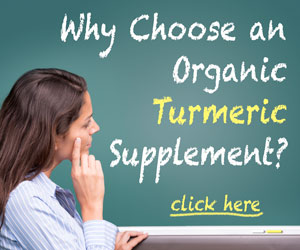
Turmeric Compounds Block Links between Metabolic Syndrome and Psoriasis
It may seem surprising that metabolic syndrome and psoriasis have anything in common. However, some population studies suggest that a greater number of people with psoriasis have metabolic syndrome. How are the two connected? (ix.20, 24, 53)
The Links between Metabolic Syndrome and Psoriasis
The most obvious commonality of psoriasis and metabolic syndrome is that both are chronic and inflammatory. At the cell level, it turns out the two conditions share other characteristics. These include: (ix.54-56)
Unhealthy angiogenesis. Development of new blood vessels, including the tiny ones in skin, is a normal process called angiogenesis. But when there's chronic inflammation angiogenesis can be unhealthy. Studies show it contributes to both psoriasis and metabolic syndrome. (ix.54-56)
Abnormal hormone levels. Higher BMI (typically found in metabolic syndrome) is coupled with increased leptin and decreased adiponectin hormones. The same has been found in psoriasis patients who also have metabolic syndrome. These hormones are involved in both metabolism and angiogenesis. Abnormal levels could have the following effects: (ix.53, 55, 57)
- May aggravate inflammation and psoriasis symptoms. Low adiponectin levels are linked to high CRP levels, a sign of inflammation. Conversely, adiponectin is anti-inflammatory. Studies suggest high CRP levels increase psoriasis severity. (ix.52, 57)
- May reduce effectiveness of psoriasis treatment. Psoriasis patients with high CRP levels have shorter periods of time without psoriasis symptoms. (ix.52)
- Contributes to angiogenesis. High levels of leptin promote angiogenesis (while adiponectin has been shown to block it). Adiponectin may also help prevent diabetes. A metabolic syndrome condition, diabetes is linked to higher risk of psoriasis. (ix.24, 53, 55, 57)
Factors such as hormone imbalances and angiogenesis contribute to each disease separately. Still, these factors may help explain the increased rates of psoriasis in people with metabolic syndrome. (ix.54-56)
Turmeric's Multi-Targeted Approach
Researchers suggest substances that block angiogenesis help relieve psoriasis. Some turmeric compounds suppress angiogenesis by blocking growth factors and enzymes that stimulate it. A number of turmeric compounds also suppress high leptin and boost adiponectin levels. These include: (ix.54-55, 58)
| Turmeric Form or Compound | Blocks Pro-Angiogenesis Factors | Boosts Adiponectin | Suppresses High Leptin Levels |
|---|---|---|---|
| Alpha-linolenic acid (ix.14, 59-60) | ♦ | ||
| Ar-turmerone (ix.16, 61-62) | ♦ | ||
| Caffeic acid (ix.16, 41) | ♦ | ||
| Curcumin (ix.40-41, 61-63) | ♦ | ♦ | ♦ |
| Eugenol (ix.16, 60) | ♦ | ||
| Limonene (ix.16, 64) | ♦ | ||
| Linoleic acid (ix.62, 65) | ♦ | ||
| Myricetin (ix.38, 66) | ♦ | ||
| Niacin (ix.14, 63) | ♦ | ||
| Quercetin (ix.38, 41, 62, 67) | ♦ | ♦ | ♦ |
| Resveratrol (ix.58, 62, 68) | ♦ | ♦ | |
| ρ-coumaric (ix.16, 69) | ♦ | ||
| Turmeric, Whole Extract (ix.61) | ♦ | ||
| Vitamin C (ix.14, 70) | ♦ | ||
| Vitamin E (ix.14, 62) | ♦ |
Clinical research shows that turmeric's curcumin compounds also reduce CRP levels. This suggests that the turmeric compound could enhance the effectiveness of psoriasis treatments and help keep patients symptom-free longer. (ix.71)
Join the 1000s of People Who Are Discovering the Benefits of Turmeric.

Healthceuticals® Turmeric Curcumin Complex
100% Certified
Organic ingredients
- Organic Turmeric Extract - standardized to 95% curcuminoids.
- Organic Whole Turmeric - provides full spectrum antioxidant, anti-inflammatory turmeric benefits, including turmerones and numerous vitamins, minerals, and phytonutrients
- Organic Black Pepper Extract - standardized to 95% piperine; dramatically enhances bioavailablity.
- Organic Phospholipids - markedly improve absorption.
- Organic Ginger - works synergistically with turmeric to provide more powerful benefits.
- Absolutely FREE of potentially harmful additives and fillers such as magnesium stearate.




